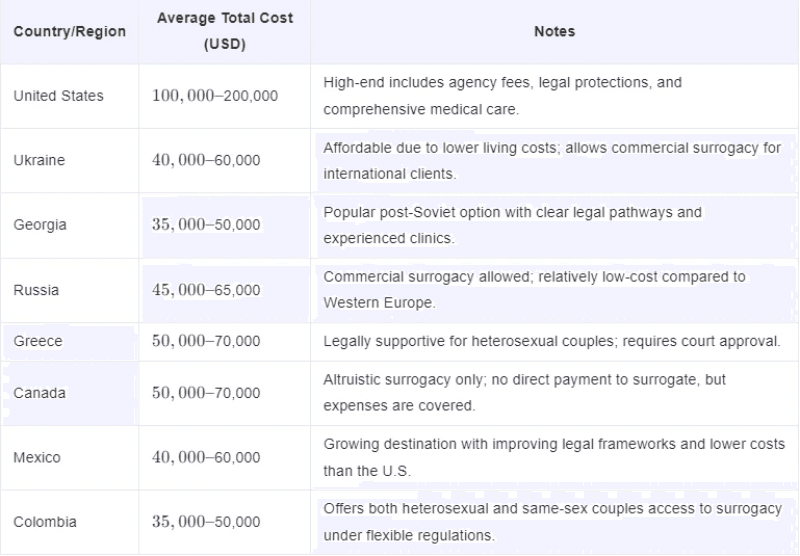Introduction: The Rising Interest in Surrogacy Costs
As surrogacy continues to grow as a viable option for individuals and couples facing fertility challenges, understanding the financial implications becomes increasingly important. Prospective parents often ask: How much does surrogacy cost? And more specifically, What factors influence surrogate cost across different countries?
Unlike traditional pregnancy or adoption, surrogacy involves multiple parties, legal processes, medical procedures, and variable compensation structures. These elements significantly impact the total expense.
This article explores the global landscape of surrogate costs, breaking down the components that contribute to pricing, comparing country-specific averages, and offering insights into how intended parents can make informed, budget-friendly decisions.

Factors That Influence Surrogate Cost
The cost of surrogacy varies widely depending on several key factors:
1. Geographic Location
Different countries have vastly different healthcare systems, legal environments, and living standards—all of which affect surrogacy expenses. For example, surrogacy in the United States tends to be among the most expensive due to high medical and legal fees, while countries like Ukraine or Georgia offer more affordable options.
2. Type of Surrogacy
Gestational surrogacy (where the surrogate has no genetic link to the child) is generally more expensive than traditional surrogacy because it requires advanced IVF techniques and embryo transfer.
3. Legal Framework
Countries with well-established surrogacy laws often come with higher legal fees but provide greater security and clarity for all parties involved.
4. Medical Procedures
In vitro fertilization (IVF), embryo screening, egg or sperm donation, and other reproductive technologies add to the overall cost.
5. Surrogate Compensation
Whether surrogacy is commercial or altruistic determines whether the surrogate receives additional compensation beyond medical and living expenses.
6. Agency Fees
Many intended parents use surrogacy agencies for matching, coordination, and support services, which also factor into the total investment.
7. Additional Expenses
These may include travel, accommodation, insurance, psychological counseling, and unforeseen complications during pregnancy.
Understanding these variables helps intended parents better estimate their financial commitment and plan accordingly.
Global Comparison of Surrogate Costs
Let’s take a closer look at the average surrogate costs across major surrogacy destinations:

While these figures provide a general benchmark, individual circumstances—such as the need for donor gametes, multiple IVF cycles, or gestational complications—can increase the final amount.
Breaking Down the Surrogate Cost Structure
To better understand where the money goes, here’s a typical cost breakdown for a standard surrogacy journey:
Medical Expenses (Approx. 30–40%)
- IVF and embryo transfer
- Prenatal care and delivery
- Genetic testing and diagnostics
- Medications and hormonal treatments
Surrogate Compensation & Expenses (Approx. 25–35%)
- Monthly living allowance
- Health insurance coverage
- Maternity clothing and transportation
- Postpartum recovery support
Legal Fees (Approx. 10–15%)
- Drafting and reviewing contracts
- Establishing parental rights
- Court filings and citizenship documentation
Agency Fees (Approx. 10–15%)
- Matching services
- Case management
- Travel coordination
- Psychological support
Miscellaneous (Approx. 5–10%)
- Travel and accommodation for intended parents
- Translation services
- Unexpected medical or legal costs
It's essential to work with transparent agencies and clinics that provide itemized cost lists upfront to avoid hidden charges later.
Is Surrogacy Worth the Cost?
For many intended parents, the emotional and psychological value of having a biological child outweighs the financial burden. However, surrogacy is not just about fulfilling a personal dream—it also involves complex ethical, legal, and social considerations.
Prospective parents must weigh the following:
- Emotional Investment: The surrogacy journey can be emotionally taxing, requiring patience, resilience, and strong communication.
- Financial Planning: It’s crucial to assess one’s financial readiness and explore financing options such as loans, crowdfunding, or insurance coverage.
- Ethical Considerations: Choosing an ethical surrogacy program that respects the surrogate’s autonomy, health, and rights is vital.
- Long-Term Commitment: Surrogacy is a long-term process that spans months or even years, involving multiple stages of planning, treatment, and legal formalities.
Ultimately, whether surrogacy is “worth it” depends on individual priorities, values, and life goals.
Financing Options for Surrogacy
Given the significant investment required, many families explore various ways to fund their surrogacy journey:
Personal Savings
Most common method—ideal for those who have planned ahead.
Loans & Fertility Financing Programs
Several banks and private lenders offer specialized fertility loans with flexible repayment terms.
Insurance Coverage
Limited coverage exists in some countries; typically covers the surrogate’s medical needs rather than the entire surrogacy process.
Crowdfunding & Fundraising
Platforms like GoFundMe allow families to raise funds through community support.
Employer Benefits
A growing number of companies now offer fertility benefits, including partial coverage for surrogacy-related expenses.
Careful financial planning and research can help intended parents manage the surrogate cost effectively.
Tips to Reduce Surrogacy Expenses Without Compromising Quality
While surrogacy is inherently costly, there are ways to minimize expenses without sacrificing safety or success rates:
- Choose a Cost-Effective Destination: Countries like Georgia, Colombia, and Mexico offer high-quality care at lower prices compared to the U.S. or Western Europe.
- Use Frozen Embryos: Fresh IVF cycles are more expensive than using previously frozen embryos.
- Opt for Known Surrogates: If possible, working with a friend or relative can reduce agency fees and streamline the process.
- Negotiate Package Deals: Some clinics and agencies offer bundled services that include medical, legal, and travel expenses.
- Avoid Multiple Cycles: Success in the first cycle reduces overall costs; choosing experienced clinics improves this likelihood.
- Understand Insurance Options: Ensure the surrogate has adequate health coverage to prevent unexpected out-of-pocket expenses.
- Plan Ahead: Early preparation allows for better budgeting, loan applications, and securing preferred surrogates and clinics.
Conclusion: Making Informed Decisions About Surrogate Cost
Surrogacy represents a significant financial and emotional investment. While the surrogate cost can vary dramatically based on location, medical needs, and legal requirements, understanding these variables empowers intended parents to make informed choices.
By selecting the right destination, preparing financially, and working with reputable professionals, surrogacy can be both affordable and rewarding.
Whether you're exploring surrogacy for the first time or deepening your understanding of its financial aspects, staying informed is key to navigating this transformative journey.

